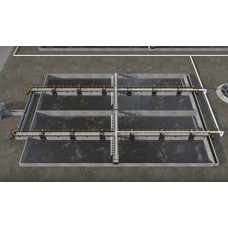The process of treating domestic and industrial wastewater based on the biochemical decomposition of organic matter (proteins, fats and carbohydrates to methane, hydrogen sulphide and carbon dioxide) by aerobic and anaerobic bacteria in specialised plants.
Biological wastewater treatment, a method of treating domestic and industrial wastewater that involves the biochemical destruction (mineralisation) by microorganisms of organic substances (organic pollutants) dissolved and emulsified in the wastewater.
The microorganisms (bacteria) use these substances as a source of food and energy for their vital functions. During the respiration process, the microorganisms oxidise the organic substances and release the energy needed for their vital functions. Part of the energy is used for cell synthesis processes, i.e. increasing the mass of bacteria, the amount of activated sludge and the biological film in the wastewater treatment plant.
The mineralisation of organic compounds in waste water is carried out by bacteria, which can be divided into 2 groups according to their relationship with oxygen: Aerobic (using oxygen dissolved in the water during respiration) and Anaerobic (developing in the absence of free oxygen).
In addition to dissolved organic matter, wastewater contains suspended solids, resins and oils that must be removed prior to biological treatment. Screens, grit chambers and sedimentation tanks are used for this purpose.
Aerobic biological treatment is carried out under natural conditions (in irrigation fields, filtration fields), in biological ponds and in artificially created environments where the activity of microorganisms is intensified - in aerotanks, aerofilters, biofilters.
Anaerobic treatment is carried out in digesters. The choice of the type of plant depends on the type and quantity of waste water, local conditions, quality requirements of the treated water, etc.
As a result of complete treatment, biochemically oxidised organic matter in the water is virtually absent. The water loses its ability to decompose, becomes transparent and bacterial contamination is greatly reduced. Wastewater containing sufficient quantities of biogenic elements (nitrogen, phosphorus and potassium), which are necessary for microorganisms, undergoes biological treatment. In some cases, nutrients are added to the wastewater in the form of saline solutions prior to treatment.

